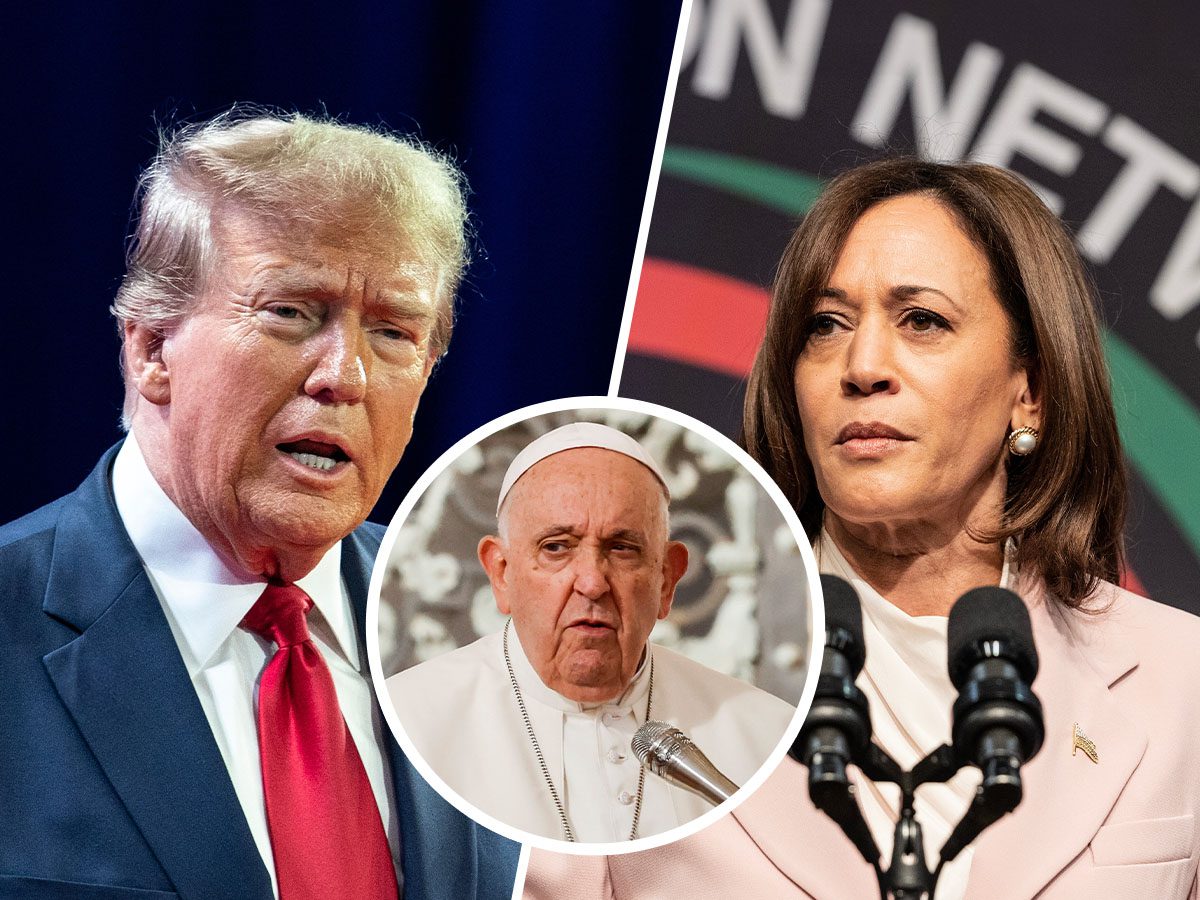
In a rare but impactful statement, Pope Francis addressed the upcoming U.S. presidential election, urging Catholic voters to make a conscientious decision between former President Donald Trump and Vice President Kamala Harris. During a press conference aboard his papal airplane after a 12-day tour of Southeast Asia and Oceania, the pope called on Catholics to “choose the lesser evil” between the two candidates, emphasizing the moral responsibility of voting.
The pope’s remarks struck at the heart of two of the most divisive issues in modern American politics: abortion and immigration. While Pope Francis criticized Harris for her staunch support of abortion rights, which he referred to as “an assassination,” he also condemned Trump’s hardline immigration policies, describing the refusal to welcome migrants as “a sin.”
“You must choose the lesser evil,” Pope Francis told reporters. “Who is the lesser evil? That lady or that gentleman? I don’t know. Everyone, in conscience, [has to] think and do this.”
The pope’s comments reflect the complexities facing many Catholic voters in the U.S. who find themselves divided on key moral and social issues. With more than 50 million Catholics in the country, many of whom reside in critical swing states like Wisconsin and Pennsylvania, the Church’s teachings have the potential to influence the election heavily.
Pope Francis, while acknowledging the moral dilemma, was clear in one directive: participation in the democratic process is essential. “Not voting is ugly. It is not good. You must vote,” the pontiff said. His remarks underscore the importance he places on Catholics actively engaging in politics, even when the choice feels morally ambiguous.
By urging Catholics to “choose the lesser evil,” the pope highlighted the need for voters to weigh their values carefully, considering the candidates’ positions on issues that affect the sanctity of life, human dignity, and social justice. However, Pope Francis did not endorse either candidate, leaving the decision to the conscience of individual voters.
Pope Francis didn’t shy away from calling out the moral failings of both candidates. On the issue of abortion, Harris has been a vocal advocate for women’s rights, including her desire to codify Roe v. Wade into law if elected. This position has drawn sharp criticism from the Catholic Church, which holds a firm pro-life stance. The pope condemned abortion as an “assassination,” saying, “On these things, we must speak clearly. No ‘but’ or ‘however.'”
However, Francis didn’t reserve his criticisms solely for Harris. He took issue with Trump’s approach to immigration, particularly his promise of mass deportations if re-elected. “Not giving welcome to migrants is a sin. It is grave,” the pope stated. His comments reflect the Church’s consistent stance on the protection of migrants and refugees, a theme that has been central to Francis’ papacy.
“Whether it is the one who is chasing away migrants or the one who that kills children, both are against life,” the pope continued, indicating that both candidates’ positions on these critical issues are at odds with the Church’s teachings on the sanctity of life.
This isn’t the first time Trump and Pope Francis have clashed. In 2016, the two clashed when the pope criticized Trump’s plan to build a wall along the U.S.-Mexico border, calling it “not Christian.” At the time, Trump fired back, defending his faith and calling it “disgraceful” for the pope to question his Christian beliefs.
“I’m a very good Christian,” Trump said during a news conference following the pope’s criticism. He also accused the pontiff of being used as a “pawn” by the Mexican government in the border wall debate.
The tension between the two leaders over immigration highlights a fundamental divide in their worldviews. While Trump’s policies focus on national security and controlling immigration, Pope Francis has consistently advocated for the rights of migrants, urging nations to be more welcoming and compassionate toward those seeking refuge.
The moral complexities of this election are not new for Catholic voters, who have faced similar dilemmas in past elections. In 2022, Pope Francis criticized President Joe Biden, also a Catholic, for his pro-choice stance on abortion, calling it an “incoherence” with the faith. While the pope left the decision up to Biden’s “conscience,” the comments highlighted the tension many Catholics feel when voting for candidates whose policies may conflict with their religious beliefs.
As the 2024 election approaches, Catholic voters are again caught between candidates who represent different facets of moral challenges. The Church’s teachings on the sanctity of life and the dignity of the human person encompass issues like abortion, immigration, social justice, and care for the vulnerable. Pope Francis’ call to “choose the lesser evil” reminds voters of the gravity of the decision and their responsibility to weigh these issues in light of their faith.


